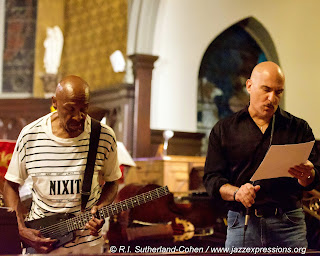NYC
Jazz Record, November 2019
CHARLEE ELLERBE
 |
| Performing my poem for Bern "Dancing to Incessant June" at the 2019 Bern Nix Jazz Festival accompanied by Charlee Ellerbe. Photo by Robert Sutherland-Cohen |
As the
Bern Nix Jazz Festival wrapped on September 28, Charlee Ellerbe crouched at
stage-right, packing up his Steinberger 6-string. “The truth is”, he said sans irony,
“I’ve never called myself a guitarist.
This is a vehicle for the melodies, the arrangements I hear”. Ellerbe, esteemed
guest artist of this event honoring Prime Time’s other guitarist, held
the audience in a state of fixation as he crafted melodic assaults and agitational
pulsations on this vehicle he played 14 years with Ornette Coleman, time with Sun
Ra and for the Coleman memorial at Lincoln Center and beyond. And then there is
Matrix 12:38, which Ellerbe pridefully cites as wholeheartedly Harmolodic. “Each
note can be everything to every other note”.
Born in Philadelphia,
1950, Ellerbe was inspired by the R&B and pop sounds in his midst. Seeing a
guitarist friend perform in 1964, he delved into the instrument, listening closely
to Kenny Burrell but, “I was more interested in what non-guitarists did, how
McCoy Tyner juggled keys”, he explained. “And I loved Burt Bachrach; the
arrangements gripped me”. Drawn to rock
music, his propensity for loud volumes and distortion grew along with the
genre’s development. “Jimi Hendrix changed everything. And (Chicago’s) Terry
Kath. His playing was creative, so unpredictable. What matters most is that the
instrumentalist speaks from their soul”
Ellerbe
studied composition at Philadelphia’s celebrated Combs College of Music,
preparing for a career as a studio arranger. “I played in Top 40 bands and worked
as a spot-welder. Caught fire a couple of times when the sparks flew!” A friend
then playing trombone with the Trammps, whose “Disco Inferno” was a mass hit,
advocated for Ellerbe’s hiring over months. “Finally I got the call and was
touring within two weeks”.
His tenure
with the band continued, but he was also recruited by organist Charles Earland,
via his friend, bassist Jamaaladeen Tacuma. “Earland liked Jamaal so much he
asked, ‘Are there more like you at home?’ I was in that band for a season, then
Earland fired me one minute before I was going to quit! His ego was like too
much oatmeal in a pot that bubbles over. The following summer, Jamaal got fired
too!”, he added, laughing. But by then, Tacuma was already a member of Ornette
Coleman’s latest aggregation and immediately recommended Ellerbe. “I didn’t want
to do it at first. I wanted to play rock. I had my distortion pedals and I
figured Ornette would be playing acoustic jazz”. Arriving at Coleman’s
legendary Prince Street loft, Ellerbe saw Bern Nix already present. “Ornette wanted
two guitars and two basses to cover the lows and highs of the orchestral string
section. I plugged into the amplifier which was set on ‘5’ and after several
songs he approached me. I thought here it comes—but he asked me to turn UP
the volume. When I next looked over, hours had gone by”. At session’s end,
Coleman simply asked Ellerbee if he had a passport. “I reminded him that I
don’t play jazz. Ornette nodded and said ‘Okay’. So, I said it again to make
sure he understood: ‘I really don’t know any jazz’ and he again said ‘Okay’. So,
I said ‘Ornette, I play hard rock’. Finally, he just said ‘Well, play that then’.
So, what
was Prime Time like for a hard rock guitarist and wishful arranger? For Ellerbe,
nothing short of total immersion. “It was like driving on a highway: anyone can
change lanes at the last minute, but the cars also paved the highway they drove
on. After the melody, there’s nothing on the page. Ornette wanted to hear what
he couldn’t predict”.
Still, the
pace seemed insurmountable and three years in, Ellerbe offered his resignation.
“Harmolodics is a bootcamp, a university without walls. I didn’t think I could
keep up”, but instead, Ellerbee came to hold the title of “Ornette’s henchman”,
so close was his approach in performance.
Listening
to the band’s recordings, one is struck by the orchestral scope, the impossibly
intricate lines like Escher staircases leading to a common destination. It’s
said that Nix doubled the melody and Ellerbe played rhythm, but they morphed roles
and Ellerbe’s chordal patterns became banshee howls, industrial crunches and trademark
lamentations. “I needed to play aggressively. I’m not a sight reader, I’m
basically a soloist, so I beat those strings up”.
By the
‘90s, Coleman reached into directions beyond Prime Time, so Ellerbe taught at Philadelphia
cultural center the Clef Club before joining Sun Ra’s Arkestra for several
years. “It taught me a whole other responsibility. In the 1940s, big band
guitarists held down the rhythm and I’d never done that before”.
However,
the lure of Harmolodics proved lasting, moving Ellerbe to form the riveting
ensemble Matrix 12:38, “We’re the only band branched off from Prime Time which fully
perpetuates the Harmolodic concept. I
write the melodies and they bring in everything they know”. With a line-up of
Ellerbe, drummer Anthony Matthews, bassist Kenny Jackson Jr and percussionist Ready
Freddie, with various horn players, the extension of Prime Time is apparent,
but so is the relationship between music and atmosphere. Ellerbe is planning a
recording through Philly radio station WRTI, with the goal of New York dates,
followed by Europe. “Out of the Prime Time band, the public has heard from
everyone but me. When I come out, it’ll be brand new. Unpredictable”




No comments:
Post a Comment